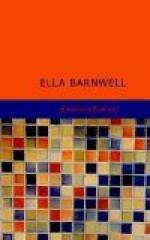In less than a minute the hunter came in sight of his dog, which he found standing with his hind feet on the ground and his fore-paws resting on the carcass of a horse, that had apparently been dead but a short time. As Caesar perceived his master approach, he uttered another of those peculiar, long, low, mournful howls, which the superstitious not unfrequently interpret as omens of evil.
“Good heavens!” exclaimed the hunter, as he came up; “thar’s been foul play here, Caesar—foul play, for sartin. D’ye think, dog, it war Indians as done it?”
The brute looked up into the speaker’s face, with one of those expressions of intelligence or sagacity, which seem to speak what the tongue has not power to utter, and then wagging his tail, gave a sharp, fierce bark.
“Right, dog!” continued the other, as, stooping to the ground, he began to examine with great care the prints left there by human feet. “Right, dog, they’re the rale varmints, and no mistake. Ef all folks war as sensible and knowing as you, thar would’nt be many fools about, I reckon.”
Having finished his examination of the ground, the hunter again turned to look at the carcass of the horse, which was lying on its left side, some two feet from the path, and had apparently fallen dead from a shot in the forehead, between the eyes. An old saddle, devoid of straps, lay just concealed under the branching cedars. The ground around was trodden as if from a scuffle, and the limbs of the trees were broken in many places—while in two or three others could be seen spots of blood, not even yet dry—none of which informants of the recent struggle escaped the keen observation of the woodsman. Suddenly the dog, which had been watching his master’s motions intently, put his nose to the ground, darted along the path further into the ravine, and presently resounded another of those mournful howls.
“Ha! another diskivery!” exclaimed the hunter, as he started after his companion.
About thirty yards further on, he came upon the carcass of another horse, which had been killed by a ball in the right side, and the blow of some weapon, probably a tomahawk, on the head. By its side also lay a lady’s saddle, stripped like the former of its trappings. This the woodsman now proceeded to examine attentively, for something like a minute, during which time a troubled expression rested on his dark, sunburnt features.
“I’m either mightily mistaken,” said he at length, with a grave look, “or that thar horse and saddle is the property of Ben Younker; and I reckon it’s the same critter as is rid by Ella Barnwell. Heaven forbid, sweet lady, that it be thou as met with this terrible misfortune!—but ef it be, by the Power that made me, I swar to follow on thy trail; and ef I meet any of thy captors, then, Betsey, I’ll just call on you for a backwoods sentiment.”




